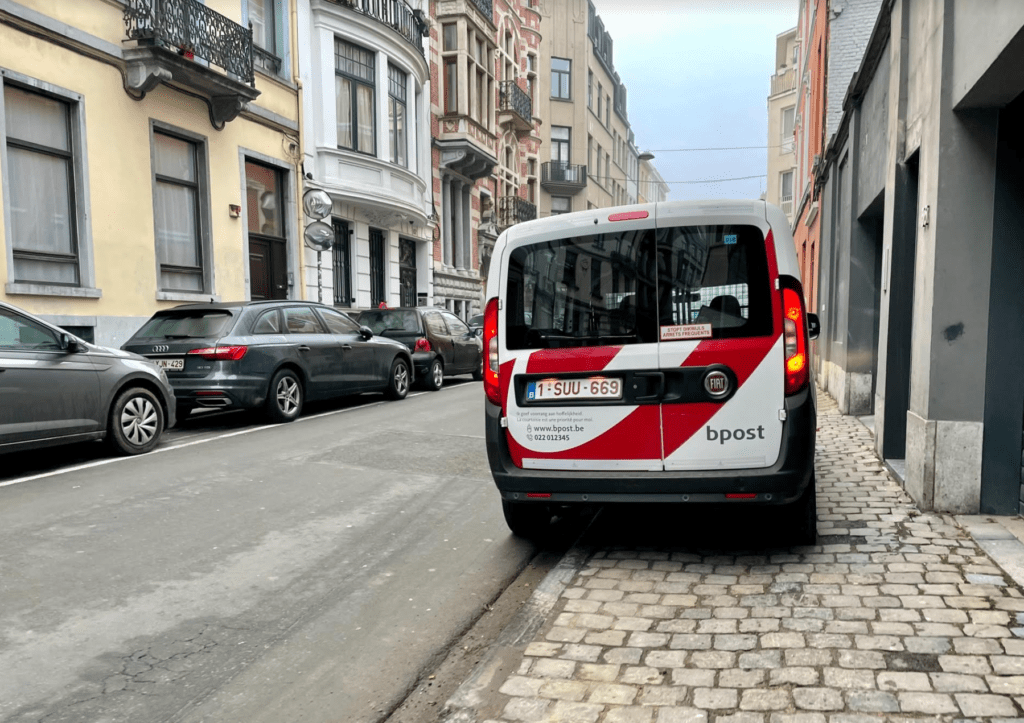Nowhere in Europe do drivers flout parking rules more than in Belgium, and the phenomenon of wrongful parking is becoming increasingly common, road safety institute Vias warned.
From double parking to blocking pavements, Belgians pay little regard to rules about where to leave their vehicles. A quarter of drivers (24%) confessed to parking on a cycling path, Vias reported based on the results of a European survey by the Foundation Vinci Autoroutes on dangerous and inappropriate behaviour in traffic. This is up from 2022 when the figure was at 21%.
"Almost one in four Belgian drivers responded 'Yes' to the question: 'When driving a car, do you ever stop or park in a cycle lane?' This makes us score the worst of all European countries," observed Vias' spokesperson Stef Willems. He added that the European average is 18%.
Parking or idling on the cycle path is becoming more common, despite being a second-degree infringement (meaning that it indirectly endangers people's safety). The offence is punishable by fines that can range from €110 to €1375 for repeat offenders. In some cases it can even be combined with a driving ban, sometimes lengthy.
Police forces across the country have in recent years increased checks of cars parked on pavements and cycle paths, but it remains common.
One in eight Belgian drivers (13%) responded that they occasionally park in a parking space for people with disabilities, up from 10% last year. This too is a second-degree violation. Willems noted that these parking spaces are wider so that disabled people can safely exit their vehicles. Occupying them can therefore put disabled people at risk if they have to park in a 'normal' space as a result.
The number of people who in the last year double-parked or used a space reserved for people with electric cars has also risen.
Not-so-active transport
The survey confirmed that the car remains the main mode of transport across Europe but that for daily journeys active modes of transport are becoming more widespread.
But Belgium also scores badly in this respect: only half of the country's respondents walk regularly – the lowest percentage of any European country and well below the European average of 66%. In neighbouring France, this figure is 62% and in the Netherlands, it is as high as 73%. The Greeks are the most active (78%).
Unsurprisingly, the Dutch cycle most regularly (58%) – far more than Belgians (28%) despite bicycles becoming more popular as a means of transport in recent years.
Related News
- Three in four car drivers in Wallonia admit to speeding
- Brussels increasingly cracking down on 'rodeo drivers', but battle is complex
The Foundation Vinci Autoroutes stressed that as more diverse modes of transport compete for limited public space, having space for all becomes more complex. This has resulted in a large majority of road users becoming less at ease when on roads.
93% of all European respondents indicated that this anxiety may be linked to the risky behaviour of other road users. Pedestrians are greatly affected: the majority are afraid that a motorist will not stop to let them pass when they are on a pedestrian crossing, for example.
"The lack of space, traffic density or simply the desire for greater safety are all reasons why cyclists encroach on spaces reserved for other road users, at the cost of endangering themselves," the study states.

